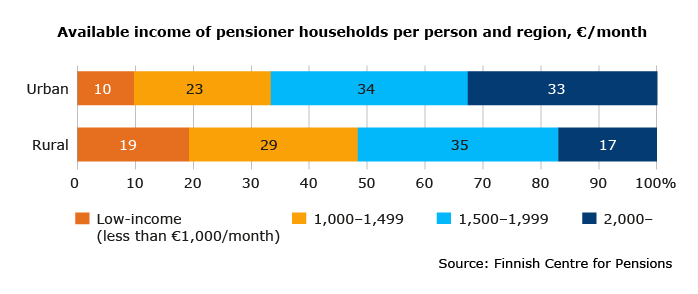Questionnaire Survey: Retirees living in rural areas struggle with making ends meet more than do those in urban areas

Retirees who live in rural areas have a clearly lower income and struggle slightly more with making ends meet than do retirees who live in urban areas. Despite this, rural retires are not less satisfied with their lives than urban ones.
The differences in economic well-being are particularly evident when measured in income: every fifth retiree living in rural areas is a low-income pensioner and every second receives a national pension in addition to an earnings-related pension. In urban areas, only every tenth retiree is a low-income pensioner and every fourth receives a national pension.
According to a survey published today by the Finnish Centre for Pensions, rural retirees struggle with making ends meet slightly more often than do urban retirees.
Two out of five (40%) rural retirees and one in three (33%) urban retirees state that they have no money left after covering the necessary expenses.
Retirees in rural areas struggle more often than retirees in urban areas to cover medical and housing expenses. More than every third retiree living in rural areas struggle to some degree with covering these costs. Only one in four retirees living in urban areas find it somewhat difficult to cover these costs.
“It is somewhat surprising that rural retirees struggle more than urban retirees to cover housing expenses since housing costs are lower in rural than urban areas. However, since rural retirees have much lower earnings than urban retirees, the former find it more difficult to cover housing expenses and to make ends meet in general,” explains economist Satu Nivalainen (Finnish Centre for Pensions).
Financial satisfaction lower in rural areas
As a rule, retirees living in rural areas are less satisfied with their financial situation compared to retirees living in urban areas. Two out of five (41%) rural retirees and one in three (35%) urban retirees perceive their financial satisfaction to be low.
“The regional differences in the perceived economic well-being are clearly smaller than might be expected based on the income differences. In practice, making a living on a lower income is easier in rural than in urban areas. The underlying reasons may be a greater self-sufficiency in rural areas and different consumption habits”, Nivalainen explains.
Life satisfaction among rural retirees is on the same level as among urban retirees
Despite shortages in economic well-being, the life satisfaction of rural retirees is at an equal level with that of urban retirees. On a scale from 0-10, retirees’ average life satisfaction is 7.
In other words, there are certain factors that increase life satisfaction among rural retirees and compensate for their weaker income. For example, rural retirees more often live in owner-occupied houses than do urban retirees. The study shows that living in an owner-occupied house is linked to life satisfaction.
“Home ownership offers financial security and foreseeability, which increases life satisfaction. This is particularly the case if the living expenses are reasonable and the house or apartment is in relatively good condition,” says economist Kati Ahonen (Finnish Centre for Pensions).
The extensive study of the Finnish Centre for Pensions is based on a questionnaire survey conducted in 2017. The respondents (2,909 pension recipients) were aged between 55 and 85 years and received an old-age, disability or partial disability pension. The response rate was exceptionally high: 73 per cent.
Economic well-being of retirees reviewed from different angles in seven articles
- Perceptions of retirees’ economic well-being by retirement route
- Regional comparison of retirees’ perceived and overall economic well-being
- Connection between retirees’ life satisfaction and home ownership
- Subjective income comparisons and financial satisfaction
- Working while drawing an old-age pension and motives for working
- Inter-household help as part of retirees’ livelihood
- Open-ended responses on retirees’ perceptions of factors that hinder or facilitate making ends meet

Facts
- Every fifth retiree in rural areas is a low-income pensioner. The corresponding figure in cities is every tenth.
- Low-income pensioner households are those where, after taxes, the available income is less than €1,000/month per person. This is about 50% of the median income of Finnish citizens.
- The income data is based on information on the households’ available income provided by the respondents.
Publication
Statistics on pensions
Statistics on Pensioners in Finland
More information
Satu Nivalainen, Economist, phone +358 29 411 2151, satu.nivalainen(at)etk.fi
Kati Ahonen, Economist, phone +358 29 411 2539, kati.ahonen(at)etk.fi